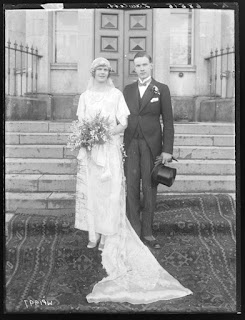Surprisingly, wedding traditions in the 1800s weren't all that different from what they are now. The terminology is sometimes different, but the concepts are much the same. For instance, what we call dating was referred to as courtship in the 19th century. Here are some terms you may not be familiar with:
The Chivari was a custom of French Lousiana, Florida, Michigan, and Canada in which a couple was serenaded on the night of their wedding by friends with horns, bells, whistles, pans, and other noisemakers. The racket was kept up until the revelers were invited in for refreshments and entertainment.
Courtesy of Wikicommons
Coming to Call means visiting your fiance' or the lady you hope to marry. It was also referred to as "keeping company" or "calling on." Couples would visit with friends, play music or games, or even take a walk in the garden.
Flirting and Meeting was when young folk would meet at a barn dance, corn husking, or other event and take a liking to one another. Sometimes they would openly flirt if they passed one another on the street or sat on a park bench.
Give Him the Mitten was a common phrase meaning to dump or discard one's boyfriend.
Levee is what the party or celebration after the wedding was called in some areas. Wine, tea, lemonade, and sometimes liquor, were served at the reception. White wedding cake was served as early as the 1820s, but mainly to the upper class.
Set Her Cap for Him was a common phrase for when a woman liked a man and tried to win his affections.
Courtesy of Wikicommons
Spark it/Sparking means to court, but it also referred to kissing or cuddling.
Spinsters generally referred to women born between 1860 and 1880 who remained unmarried. Eleven percent of the women during those years never married. That was the highest percentage in American history. The reason was probably due partly to the Civil War where more than 600,000 men died and to the fact that more women were getting college educations. The male viewpoint in the day was that female college graduates would make poor homemakers.
Courtesy of Wikicommons
Wedding Day Due to the minister's heavy weekend schedule, a large number of nineteenth-century weddings were held on Tuesday, Wednesday, and Thursday.
Wedding Gifts were usually given by family and very close friends only during the first half of the century. The circle expanded to include acquaintances and co-workers during the second half of the century. Most gifts were of a decorative nature, such as sugar bowls, cake baskets, ice cream knives, and napkin rings.
Purchase Mutiny of the Heart on Amazon
Vickie McDonough is the CBA, EPCA and Amazon best-selling author of 50 books and novellas. Vickie grew up wanting to marry a rancher, but instead, she married a computer geek who is scared of horses. She now lives out her dreams penning romance stories about ranchers, cowboys, lawmen, and others living in the Old West. Vickie’s books have won numerous awards including the Booksellers Best, OWFI Best Fiction Novel Award, the Inspirational Readers’ Choice awards. To learn more about Vickie’s books or to sign up for her newsletter, visit her website: www.vickiemcdonough.com







Thanks for posting today. I enjoyed hearing about the differences and similarities in wedding customs. I had heard of the chavari before...I can't imagine that that was very welcome!! Maybe that's why honeymoons came to be!!
ReplyDeleteHi Vickie, while researching family history I ran across a chavari that happened in 1910 where the bride's and groom's families sneaked to the brides/grooms house right after dark and began banging on pots and pans, playing loud music on their horns and drums, and calling them out. When the bride/groom appeared, they made the groom put the bride in a wheelbarrow and wheel her around the yard while everyone whooped and hollered and made a big to do about it. Funny people, but wanting to have fun! Blessings, my friend!
ReplyDelete